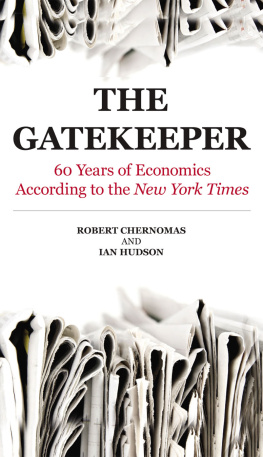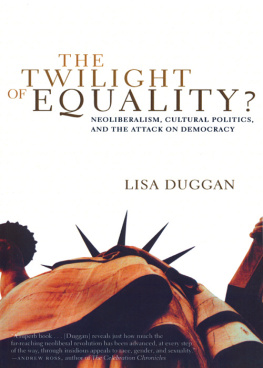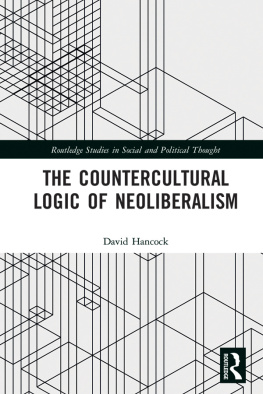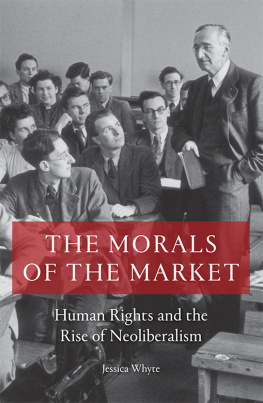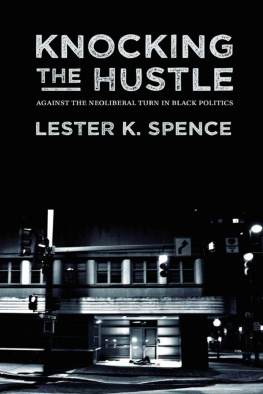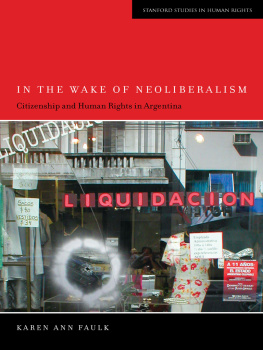Copyright Robert Chernomas, Ian Hudson, and Mark Hudson 2019
The rights of Robert Chernomas, Ian Hudson, and Mark Hudson to be identified as the authors of this work have been asserted by them in accordance with the Copyright, Designs and Patents Act 1988.
Published by Manchester University Press
Altrincham Street, Manchester M1 7JA
www.manchesteruniversitypress.co.uk
British Library Cataloguing-in-Publication Data
A catalogue record for this book is available from the British Library
ISBN978 1 5261 1018 3hardback
First published 2019
The publisher has no responsibility for the persistence or accuracy of URLs for any external or third-party internet websites referred to in this book, and does not guarantee that any content on such websites is, or will remain, accurate or appropriate.
Typeset
by Toppan Best-set Premedia Limited
To the founders of the Crescentwood Saturday Soccer Club, a team that aims to be what neoliberalism is not, a place where players and their families from many corners of the world form a fellowship to work in support of one another and, to a lesser extent, play the beautiful game. As former Liverpool manager Bill Shankly said, it's about everyone working for each other, everyone having a share of the rewards. It's the way I see football, the way I see life.
We would like to acknowledge the capable research assistance of Imalka Nilmogada, and the UM Undergraduate Research Fund for support. We also greatly appreciate the financial assistance of the Global Political Economy Research Fund from the Faculty of Arts at the University of Manitoba, which permitted us to hire Austin McWhirter, whose research assistance was absolutely top-drawer.
Thanks are due to many colleagues and associates in and outside the University of Manitoba, but our special gratitude goes out to: Mara Fridell, Dean Bavington, Clint Westman, Nick Garside, Reade Davis and the entire complement of faculty in the Economics and Society Program at the University of Manitoba (Fletcher Baragar, Jesse Hajer, Irwin Lipnowski, John Loxley, John Serieux, and Ardeshir Sepehri) for invaluable contributions and friendship, though they each might disagree with some of what is to follow.
1
A political economy for yacht owners
Just up the street from the Muse Picasso, in Antibes, France, a wandering tourist soaking in the Mediterranean atmosphere might stumble upon the Quai des Milliardaires, or at least the Accs Interdite sign at its gates. Beyond the sign, the wharves play host to a large proportion of the world's superyachtsgenerally understood to be pleasurecraft greater than 30 metres in length, but these days often exceeding 50 metres. The biggest sometimes won't fit, like the Octopus, which was owned by Microsoft co-founder, the late Paul Allen, who also owned the Seattle Seahawks of the National Football League, the National Basketball Association's Portland Trail Blazers team, and part of the Seattle Sounders Major League Soccer team. The Octopus is 126 metres, and requires a crew of 57 to keep its guests (it can fit 26 of them) comfortable, fed, and watered. Sadly for Mr. Allen, it is only the sixteenth largest superyacht in the world, though it does have a pool, a couple of helicopter pads, and a couple of submarines. Allen also owned a second superyacht (who doesn't need two superyachts?), Tatoosh, which is a more modest size, at a mere 92 metres, but seems more fun, with a movie theatre and a shaded, adjustable-depth swimming pool. For those aspirants who can't quite manage the build costs (estimated at $1 million per metre) and the annual operation (10 percent of the build cost annually), boats like Octopus and Tatoosh can be chartered. Apparently the second-largest superyacht in the world (Eclipse) goes for the bargain rate of $2 million per week, or almost $12,000 per hour. Food, fuel, water, and crew tips are additional, but for the celebrities, the hedge-fund managers, the global financiers, and the other 1 percent of the global population who hold half of its wealth, it's no problem.
Superyachts are operated and crewed in a largely regulation-free context. Crewnormally recently unemployed young adults, looking to pay off university or other debts, or maybe just looking for a taste of luxury-themed adventure and a glimpse of real wealthare themselves reasonably well-paid, but work with no protections whatsoever. Twenty-hour days are not uncommon in the rigidly gender-divided labor force required to keep the untreated teak decking in top condition, the guests instructed in jet-ski operation, the toilets sparkling, and the drinks filled. Utter discretion is mandatory, as is utter obedience. Unsurprisingly, some owners are reported to be quite friendly and generous. But others are tyrannical, and it's luck of the draw from gig to gig. Crew refer to the yacht owners, in an unfortunate but telling shorthand, as my owner. Crew can be fired at a moment's notice without cause (unless you just don't have the right look can count as such) and serve utterly at the pleasure of either the owner or the renter. The yachts have also, until very recently, operated with little to no environmental regulation. The superyacht industry battled loudly against US-based regulations in 2016 that would require boats to be equipped with machinery to reduce their considerable nitrogen oxide emissions. With a few hundred thousand dollars worth of fuel in the tank of a medium-sized superyacht, they are not very light on the carbon emissions, either. The US went through with the emissions regulations unilaterally, while the UN International Marine Organization abandoned its regulatory efforts.
The universe of the superyachtwith a tiny elite competing for status and prestige with one another, holding almost complete power over a dependent and subservient workforce, and operating in a regulatory voidis partially a result of many of the practices falling under the banner of the neoliberal, while it simultaneously holds within it the image of a neoliberal utopia. The class divisions that make the superyacht possible, the making of a world in its image, and the consequences for human well-being, are the subjects of this book.
). No one uses the term neoliberalism and then proceeds to wax poetic about the wonderful utopia created by its policies. It may be overused, and it may lack a single, agreed upon definition, but that does not mean that it is a useless term that means nothing and everything simultaneously. In fact, serious thinkers have given the definition of the term serious consideration.
Our aim is to define and illuminate neoliberalism within a coherent theoretical framework that allows for neoliberalism to be something, but not everything. In addition, we hope to reveal the pernicious effects of neoliberalization on some of the fundamental pillars of human development and flourishing. Through its effects on work, on human health, on our ignorance or enlightenment, on our capacities for politics, and our relations with non-human nature, we argue throughout this book that neoliberalism is stunting the vast majority of us.
Neoliberalism defined
, p. 3).
). In fact, it took an extraordinary and coordinated political effort involving intellectual, ideological, and above all political work to transform the state along neoliberal lines.


